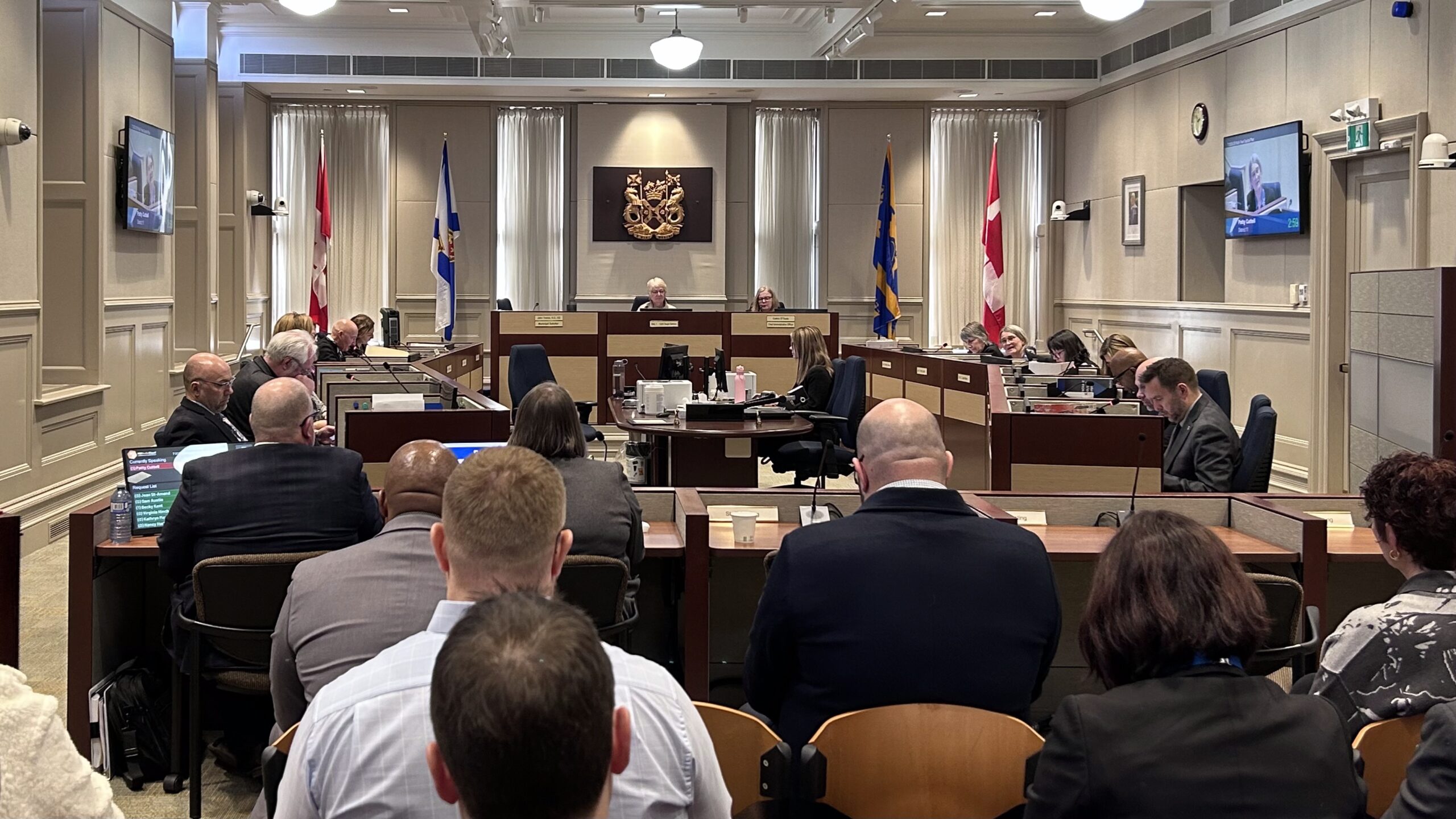Budget season launches with 5.8 per cent hike proposed in operating costs
Property tax rate proposed to increase an average of 7.6 per cent

caption
A large group of Halifax municipal staff and members of the public gathered on Wednesday to hear the beginning of this year's budget discussions.With eight new members, Halifax regional council kicked off budget deliberations Wednesday, grappling with a staff report recommending a 5.8 per cent increase in operating expenses to $1.3 billion.
Jerry Blackwood, the municipality’s chief financial officer, presented an overview of the operating budget. The 5.8 per cent increase would mostly be funded by an increase in tax rates.
Blackwood said the operating budget gets 82 per cent of its funding from property taxes. That rate would go up 7.6 per cent on average, or $189 per year per household. The municipal tax rate would go up 2.7 per cent.
A notable point on the draft operating budget was a 12 per cent decrease in expenditure for Halifax Transit.
Blackwood said this is because of the Sept. 1, 2024, fare increase, which will give Halifax Transit more money from riders, so it needs less from the city.

It’s the first HRM budget season for seven councillors and Mayor Andy Fillmore.
Many councillors’ questions were deferred to later this month, when individual city departments will be presenting.
“Especially in your first budget after you’re elected, it seems like everything just comes at you like a tsunami,” said Shawn Cleary (District 9, Halifax West Armdale).
Council voted unanimously to move the operating budget into the next stage of development.
Capital budget
The municipality’s capital budget plan, on the other hand, is projected to cost more than $318 million in the coming fiscal year and $2 billion over the next four years.
One of the capital budget plan’s priorities is maintaining existing infrastructure. The five-year plan that’s coming to a close allocated 72 per cent of the budget to maintenance and 28 per cent to growth.
The report was presented by Holly Power-Garrett, a senior asset management analyst for HRM. She said that the city’s infrastructure is playing catch-up due to “historic” population growth after the pandemic.
Chief administrative officer Cathie O’ Toole said 11,000 new people came to HRM in the past year.
The new five-year plan suggests 60 per cent be allocated to renewal and 40 to growth.
“Growth is supposed to pay for growth,” said Coun. Patty Cuttell (District 11, Spryfield – Sambro Loop). “But I think what most residents are saying is that growth is leading to higher costs.”
The capital plan is relying on debt for funding and the gap between HRM’s expenditures and revenue is expected to continue to widen over the next few years, despite the area’s growth.
The gap, according to Blackwood, is due to compensation increases and inflation. He says it is very unlikely the revenue gap will ever trend downwards.
Members of the committee noted the lack of infrastructure plans for suburban and rural districts compared to urban areas.
“On-road bicycling facilities are not being considered outside of the urban service standard. I think that’s a fundamental issue,” said Coun. Nancy Hartley (District 13 Prospect/ St. Margarets Bay).
Some committee members raised concerns about delays of projects in their districts.
“We’ve been talking about it and working on it slowly, but for four years already, and now we’re seeing that there’s nothing for another three,” said Coun. Becky Kent (District 3 Dartmouth South-Woodside), referring to funding for the Portland Street–Cole Harbour transit corridor, which is not part of the functional plan until the 2027/28 fiscal year.
Other councillors expressed concern over the 2.7 per cent tax increase for municipal residents, suggesting that perhaps too many projects were being undertaken at once.
“I’ve called staff several times asking about certain projects we’ve already passed, wondering if we can pause them,” said Coun. Trish Purdy (District 4 Cole Harbour–Preston).
She introduced an amendment requesting a report to help council choose strategic plans they can pause without breaking contracts or neglecting core services.
Blackwood and O’Toole said this move would have no effect on the current tax increase but could help in future years.
Cleary said he would vote down the amendment.
“We can’t just keep putting it back to staff and saying, ‘You guys figure it out’,” said Cleary. “If we’ve got a project that you don’t want to move forward bring that project forward and let’s talk about that particular project.”
The amendment failed to pass by a vote of 6-11.
The session ended before the capital budget was voted on.
A contingency meeting is being held on Friday. The budget will be finalized in early April.
About the author

A. Zwissler
Antonia Zwissler, who came to Halifax from Lima, Peru, will graduate this spring with a Bachelor of Journalism (Honours) degree from the University...

